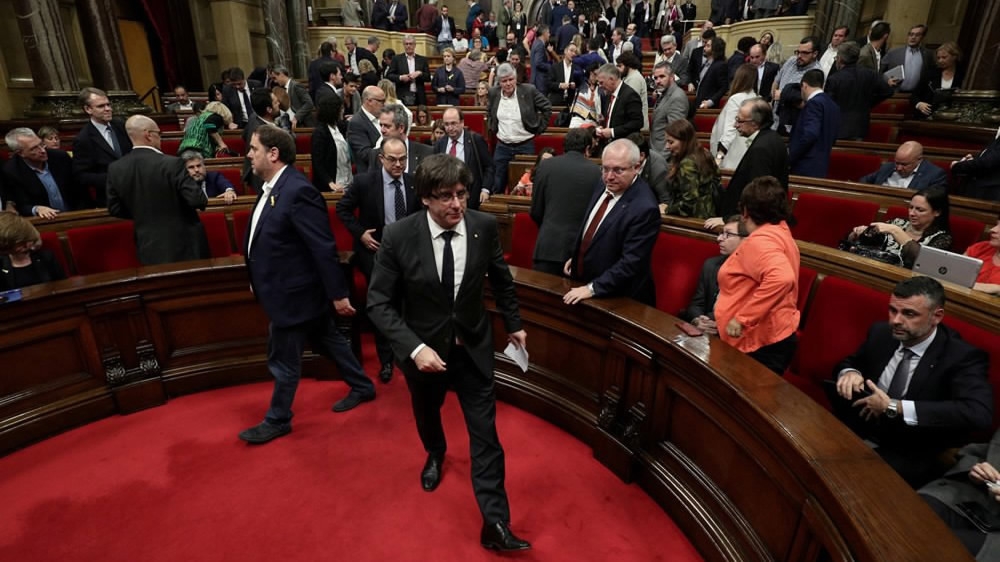
Opinions
12:24, 30-Oct-2017
Opinion: What solution in old-school Spain/Catalonia negotiation?
Guest commentary by Yann Duzert

The leaders of Catalonia decided to hold a referendum on independence in October that had no legitimacy under Spanish law and could therefore not legally reflect the opinion of the region.
Yet the day of the vote managed to show the world an image of authoritarian Spanish police service using force against the Catalonian people who claimed victimization. After this image was declared a victory, the Catalonian parliament voted last week to declare independence.
But this small group of voters has no statistical legitimacy of representation and no legal conformity with regards to the Spanish constitution. It is like an association of hunters voting for the right to hunt outside hunting season, or a small association of angry victims of violence voting for the death penalty.
Spanish Prime Minister Mariano Rajoy lost the battle of optics. Even the Spanish Senate did not agree with the decision to give Rajoy control of public media outlets in Catalonia where he has assumed under direct rule. The move creates the potential for manipulation of images and escalation of fake news, adding more confusion and aggressiveness.

Spain's Prime Minister Mariano Rajoy waves to his fellow People's Party (PP) members after delivering his speech during a debate at the Senate in Madrid on October 27. /Reuters Photo
Spain's Prime Minister Mariano Rajoy waves to his fellow People's Party (PP) members after delivering his speech during a debate at the Senate in Madrid on October 27. /Reuters Photo
The provocation through media and the lack of legal validity all led to a tense atmosphere and eventual chaos.
If Catalonia wants its independence recognized by the European Constitution, it would need the approval of all 27 EU members and there is no doubt that Spain, among others, will veto the bid.
Because of the illegal vote by the Catalonian parliament, Rajoy dissolved its autonomy and called a real independence referendum for December 21.
The European Union did not interfere because Catalonia had won the image war as a result of the force used by the Spanish police but the EU should have tried to mediate before the escalation of the impasse.

Catalan leader Carles Puigdemont hands in his ballot during a vote at the Catalan regional Parliament on independence from Spain October 27. /Reuters Photo
Catalan leader Carles Puigdemont hands in his ballot during a vote at the Catalan regional Parliament on independence from Spain October 27. /Reuters Photo
The personality of Catalonia leader Carles Puigdemont, an inflexible independence activist, has also much to do with the current chaos. He showed no ability to negotiate in a constructive and open manner with Mariano Rajoy. For his part, Rajoy has been a typical old-school negotiator - a take-it-or-leave-it style that offers no concessions.
It is true that for the past 300 years Spain given a lot of autonomy to the Catalonian people, with the right to speak their own language and make their own decisions. It seems like Catalonia wants more; it represents 19 percent of Spain’s GDP but like the central government, it is almost 100 percent in debt.
There are other negatives and questions: Catalonia would not be able to use the euro if the EU does not recognize its government. How would have its own army? How will it navigate its own economic prosperity if it does not get along with Spain and members of the EU.
Any isolation of Catalonia may lead to further instability, financial losses in tourism and a reduction in foreign investment and business. After years of low regulation over its out-of-control spending, Catalonia will require heavy taxation that may make many businesses run away. How will get out of this vicious circle?

A woman reacts while the Catalan regional parliament votes for independence of Catalonia. /Reuters Photo
A woman reacts while the Catalan regional parliament votes for independence of Catalonia. /Reuters Photo
For a start, the negotiating leaders Rajoy and Puigdemont ought to be replaced by modern negotiators who know how to frame the problem, to negotiate in good faith without dirty tricks and who know the margin of negotiation within the legal constitutions of Catalonia, Spain and Europe.
The process also needs a facilitator such as EU or the United Nations who would bring the trust and respect to match the interests, perceptions and identities of the negotiating parties.
The challenge is to let the law have its authority as the parties arrange a management tool that would smooth the way towards a satisfactory definition of autonomy and symbiotic coexistence.
(The author is a professor of negotiation at L’Université Paris-Dauphine, a visiting professor at USC Price School of Public Policy, FGV and Tsinghua University; the author of the Chinese book Negotiation for Life published by Zhejiang University Press, and a senior contributor at CGTN since 2010. The article reflects the author's opinion, and not necessarily the views of CGTN.)

SITEMAP
Copyright © 2018 CGTN. Beijing ICP prepared NO.16065310-3
Copyright © 2018 CGTN. Beijing ICP prepared NO.16065310-3